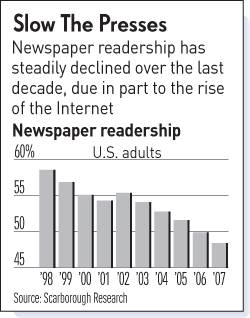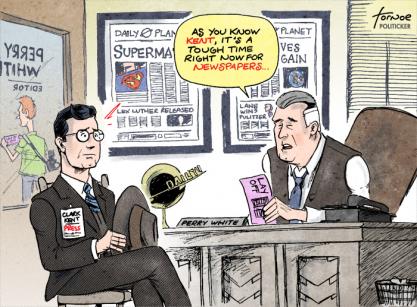As the newspaper industry winds down its worst year in history, some observers are finding hope amid the rubble.
Jonathan Zittrain points out that Twitter and Mahalo were powerful tools for documenting the crisis in Mumbai nearly two weeks ago. For many Americans, foreign news services and the BBC were all that was available to track the terrorist attacks. Few US newspapers even have stringers in Mumbai any more. Into that vacuum sprang citizen journalists with their cell phones and self-built news sites. Zittrain says he’s seen the future of news in these services. Check out the Mumbai hash on Twitter, the Mumbai Terrorist Attacks page on Mahalo and the Wikipedia entry on the Mumbai attacks. Can you read these accounts and not believe that a new kind of journalism is being created before our eyes?
European editor Frédéric Filloux and former Apple honcho Jean-Louis Gassée meander a bit before getting to the point, but finally zero in on what’s going right in the news world. They point to The New York Times’ introduction of Times Extra as an example of how the link economy is transforming the news business. Times Extra integrates news from outside sources – including competitors – into the Times’ home page. This is a bitter pill for hyper-competitive editors to swallow, but a necessary one in the new model of news.
They also point to two other recent announcements – the success of The Politico’s new wire service and Huffington Post’s $25 million capital infusion – as evidence that there’s plenty of life in the news business, just not in the old news business. “The Internet economy is moving in the right direction,” Filous writes. These stories, “provide evidence of…progress. Similar news organizations are bound to find sustainable business models.”
 If you run a newspaper, you might consider hiring Gordon Borrell for your next team-building event. Check out these quotes and paraphrases attributed to the founder of research firm Borrell Associates in Investor’s Business Daily (lightly edited):
If you run a newspaper, you might consider hiring Gordon Borrell for your next team-building event. Check out these quotes and paraphrases attributed to the founder of research firm Borrell Associates in Investor’s Business Daily (lightly edited):
- “We’re confident it’s near a bottom, and there will be a rebound.”
- Newspaper companies have plenty of growth ahead for their Internet businesses — albeit with hard work… Newspapers are planning for exponential growth from the Web — in some
- Local advertising, which newspapers are best positioned to capture, will grow 47% this year to $12.9 billion.
These optimistics comments come on top of recent news that advertising on newspaper websites declined 3% in the third quarter of 2008, indicating that the one business that should be growing is actually shrinking. They are also rather oddly juxtaposed with the chart at right. We hope Borrell is correct, but his comments shouldn’t be cause for complacency.
Miscellany
Disgraced Illinois Governor Rod Blagojevich allegedly pressured the Chicago Tribune to fire Deputy Editorial Page Editor John McCormick and other unnamed editorial board members in exchange for getting state funding that would grease the wheels for Tribune Co. to sell the Chicago Cubs. We suspect this story might have something to do with it. We also marvel that the great state of Illinois could elect a marvel of leadership like our President elect and a scumbag like Rod Blagojevich to office at the same time.
The Richmond (Va.) Times-Dispatch is laying off 18 employees while the Philadelphia Inquirer and Philadelphia Daily News will collectively cut 35 jobs, reports Editor & Publisher. No word on what percentage of their respective workforces the cuts represent. The Philadelphia layoffs will concentrate in the newsroom, however.
Self-described troglodyte Ted Venetoulis is still interested in buying the Baltimore Sun. Or maybe the 72-year-old investor is just looking to get his name in the paper. See for yourself. The Baltimore Business Journal reports that Venetoulis and a group of anonymous investors are still looking at possible acquisition of the Sun from its troubled Tribune Co. parent, but a lot has to be worked out first, including assessing the future of the newspaper industry itself. Venetoulis admits that he hasn’t looked at the Sun’s financials, that he wouldn’t want to pay too much and that he’s going to watch Tribune Co.’s bankruptcy closely. It’s too early to tell. Which makes us wonder why the BBJ committed 500 words to this meaningless story.
The Christian Science Monitor sums up the troubles plaguing the industry. This story doesn’t break a lot of new ground, but we couldn’t resist mentioning it because we’re quoted there.
And Finally…
The Daily Show analyzes the decline of newspapers in its own inimitable style.
And from Rob Tornoe, cartoonist at The Politicker:
Comments
This entry was posted on Wednesday, December 10th, 2008 at 9:45 am and is filed under Facebook, Fake News, Google, Hyper-local. You can follow any responses to this entry through the RSS 2.0 feed. Both comments and pings are currently closed.




Marvel of leadership?? Proven by what? a fawning press that refused to investigate any of his shady background? LOL!